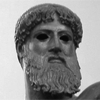- 13 Feb 2013 23:28
#14172487
Probably quite a boring choice: E.J. Hobsbawm - The Age of Revolution
I would probably find history books more interesting if the ones I read went into more depth about the lives of people, i.e. sociological history.
I would probably find history books more interesting if the ones I read went into more depth about the lives of people, i.e. sociological history.

















 - By wat0n
- By wat0n